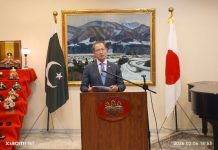ISLAMABAD: The Foreign Office on Saturday expressed the hope that India would act fairly during its month-long tenure as the president of the United Nations Security Council (UNSC).
FO spokesman Zahid Hafeez Chaudhri, while responding to a query from Dawn, said Pakistan hopes that “India will abide by the relevant rules and norms governing the conduct of the Security Council Presidency”.
India, which is currently a non-permanent member of UNSC for a two-year term, would be holding the presidency of the powerful 15-nation body for the month of August beginning Sunday.
The presidency of UNSC rotates on a monthly basis following the English alphabetical order of the names of the member states. India, which entered UNSC on Jan 1, 2021, will twice get the presidency during its term ending on Dec 31, 2022.
Calls for abiding by rules and norms governing conduct of Security Council
“As India assumes this role, we would also like to once again remind it of its legal obligation to implement the UN Security Council resolutions on Jammu and Kashmir,” the spokesman further said.
The timing of India’s presidency is important — although it is a mere coincidence that it has coincided with the second anniversary of annexation of Occupied Kashmir by India; and completion of withdrawal of foreign forces from Afghanistan.
Indian presidency means that Pakistan would not be able to seek any discussion on the situation in Occupied Kashmir in the Security Council on this occasion.
Spokesman Chaudhri had earlier at the weekly media briefing said: “5th August, 2021 would mark the completion of an unprecedented 24-month-long military siege and draconian curbs on the fundamental rights and freedoms of Kashmiri people in the aftermath of India’s illegal and unilateral actions.”
The Security Council has thrice discussed the issue of Jammu and Kashmir during the past two years.
Secondly, withdrawal of foreign forces from Afghanistan is likely to be completed by the end of August. Indian presidency could become important in case of some major development related to Afghanistan.
Pakistan has always seen India as a spoiler for the efforts for peace and reconciliation in Afghanistan.
However, the most important element of any country’s presidency is its ‘programme of work’ that lists its priorities during the one-month tenure.
India’s ‘programme of work’ shows that it will use its tenure to ‘needle’ regional rivals Pakistan and China.
The two flagship events planned by India are a briefing on counter-terrorism, and a debate on maritime security.
India’s Permanent Representative to the UN Ambassador T.S. Tirumurti, in an Op-Ed for Times of India, has written that India has been “a bulwark against any attempt to dilute the fight against terrorism and has helped in exposing those who aid, support and finance terrorists. Terrorism in our neighbourhood and beyond is of particular concern given the increasing use of AI, drones, blockchain technology, and online financing by terrorists”.
Given India’s proclivity to malign Pakistan at such forums, it is almost certain that it would use the counter-terrorism briefing for accusing its neighbour.
Similarly, the maritime security debate is expected to be used to criticise China’s role in South China Sea.
On maritime security, Tirumurti contends that “a comprehensive approach to maritime security is indispensable to safeguarding common prosperity as it protects legitimate activities and counters threats of current and emerging hostile, illegal or dangerous acts within the maritime domain. This encapsulates the PM’s vision of SAGAR — Security and Growth for All in the Region.”
APP adds: Meanwhile, Pakistan welcomed the letter by members of the European Parliament addressed to the president and vice president of the European Commission where they expressed concern over the human rights violations in India-held Kashmir.
FO Spokesperson Chaudhri in response to media queries said the letter was “another demonstration of the continuing global censure of the ongoing human rights violations and humanitarian crisis in Indian Illegally Occupied Jammu and Kashmir”.
He said although India continuously peddled false propaganda in futile attempts to push the sham narrative of so-called normalcy in occupied Kashmir, the global censure and condemnation of the Indian atrocities in the valley continued.
He said India must realise that it cannot ignore the international community’s continuing calls to end its grave and systematic human rights violations in Occupied Kashmir.











